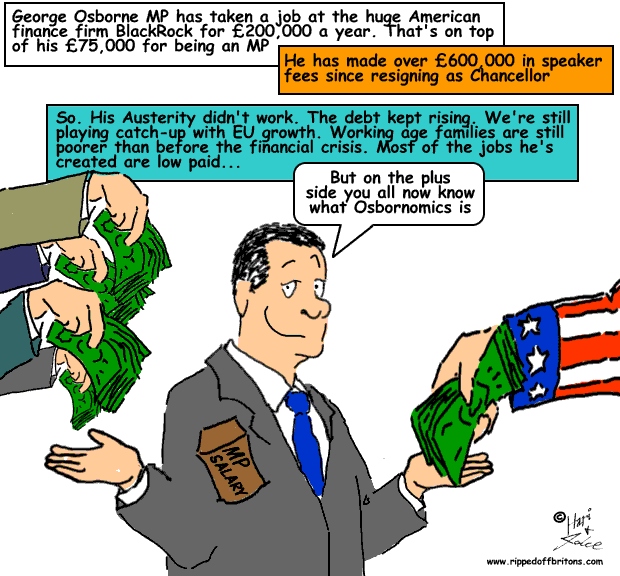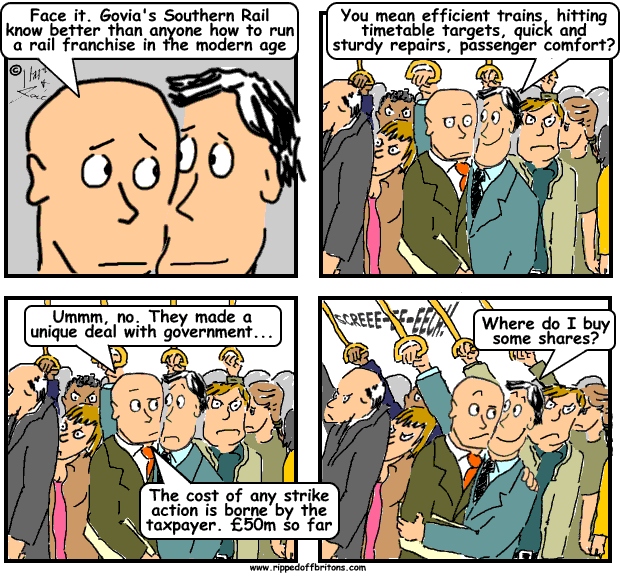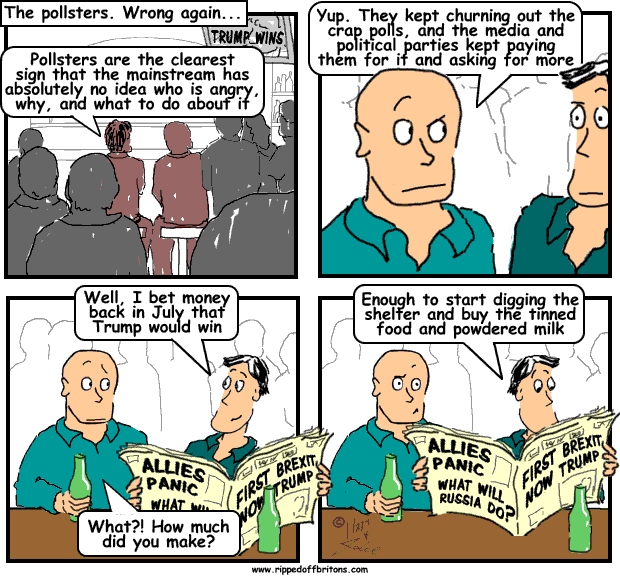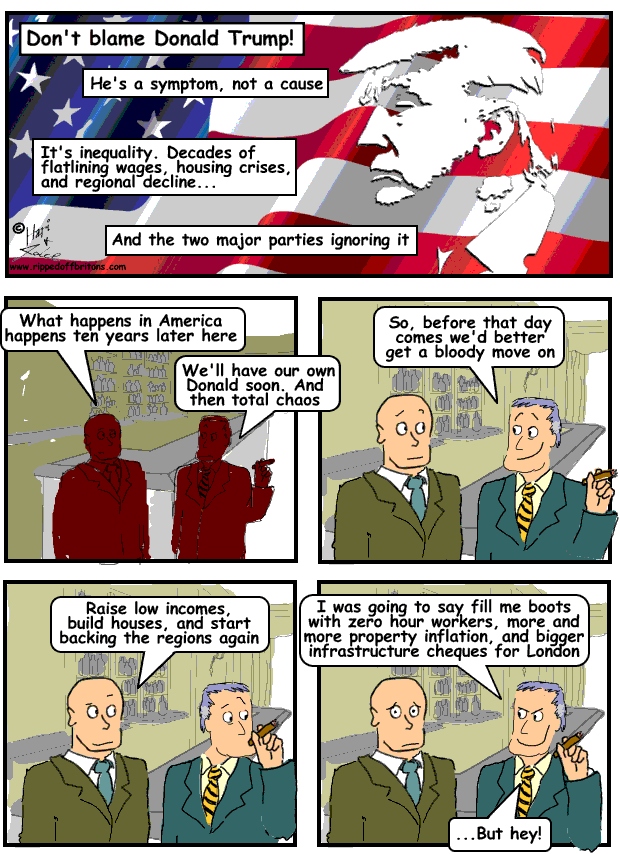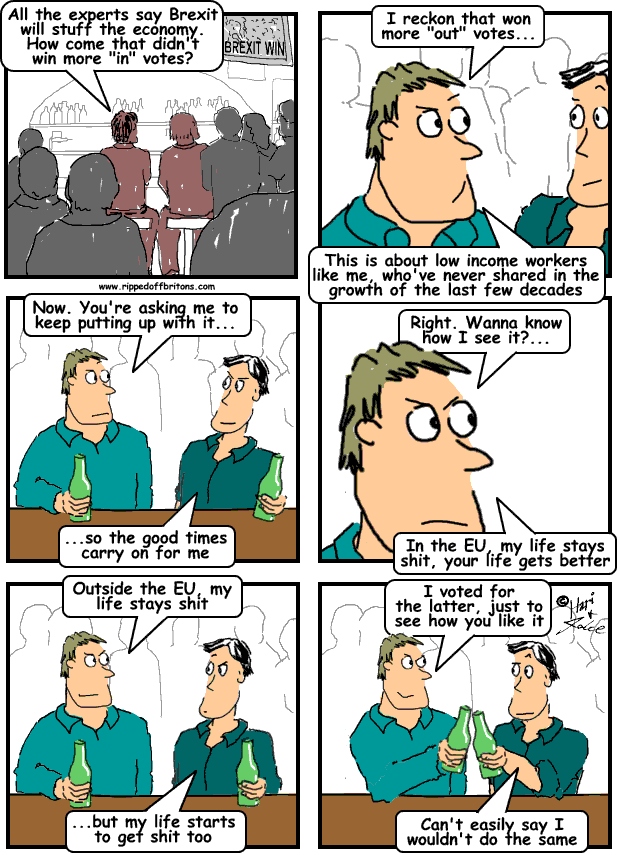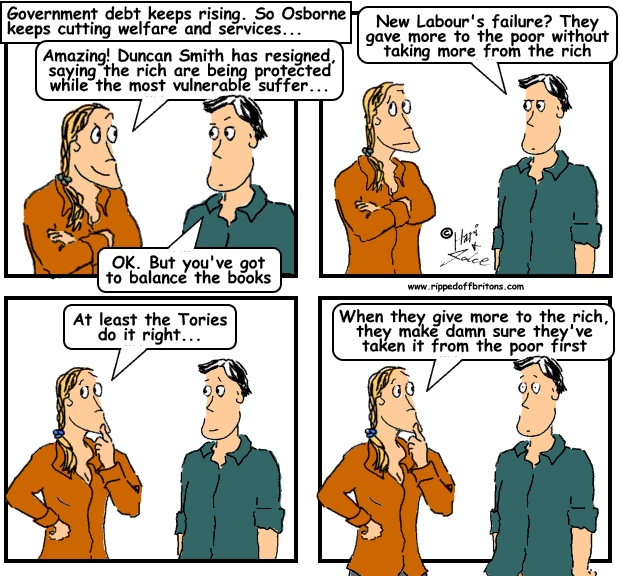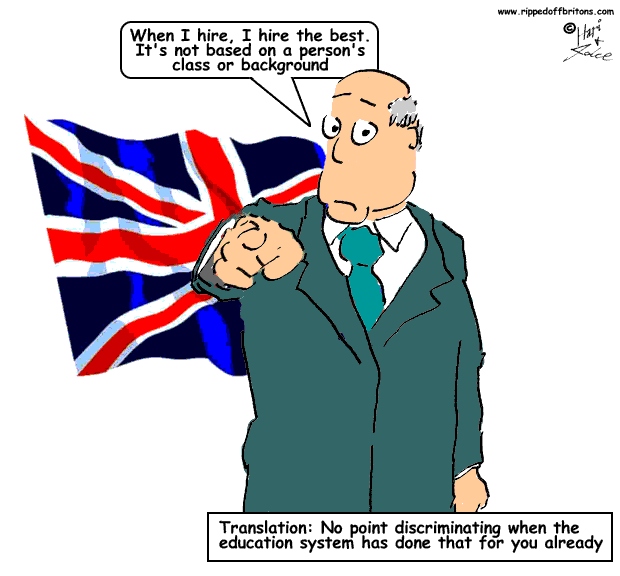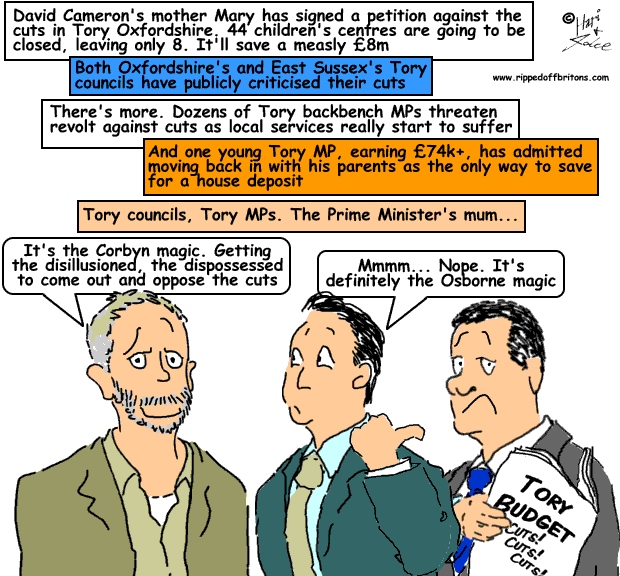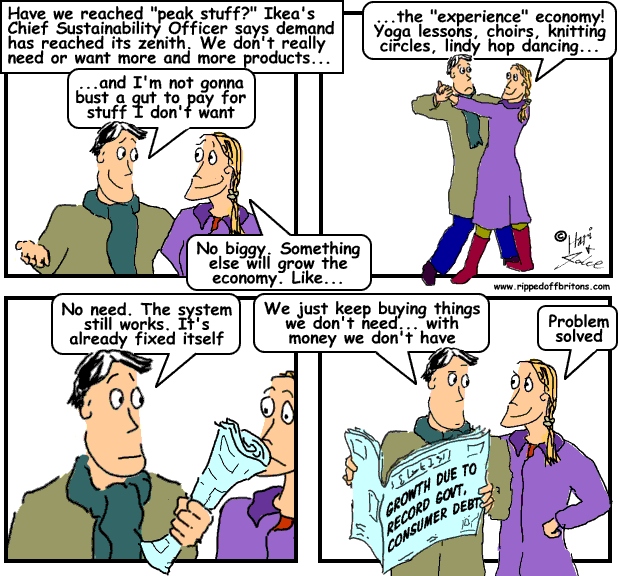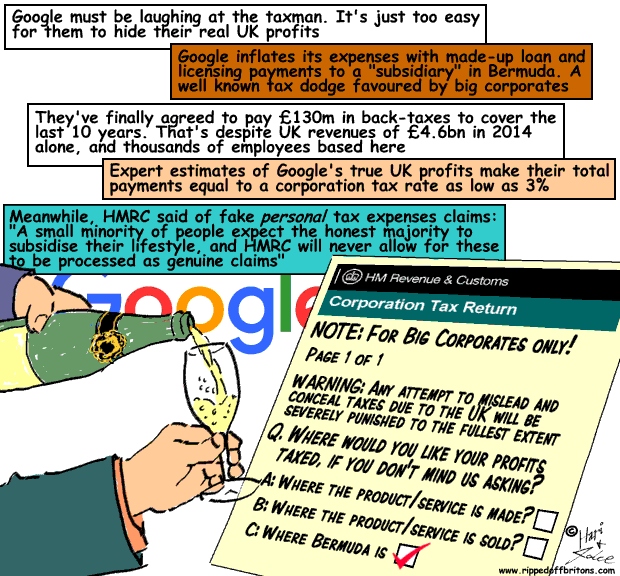
3m poor working families
face losing £2,500 a year from benefit cuts
According to the Institute for Fiscal Studies (IFS) the
freeze in benefit rates and cuts to child tax credit, coupled with the rollout
of universal credit, which has become less generous as a result of changes to
work allowances, signal “large losses” for low-income households. If the cuts
announced in 2015 were fully in place now, nearly 3m working households with
children on tax credits would be an average of £2,500 a year worse off, with
larger families losing more. The scheduled cuts for lower-income families come
alongside tax breaks worth £5bn a year that predominantly benefit middle- and
higher-income households. Although the average impact of tax and benefit
changes since 2015 has been relatively small so far, planned benefit cuts will
reduce government spending by about £15bn a year in the long run, with the
poorest working-age households facing losses of between 4% and 10% of income a
year, the IFS says. The impact of the planned cuts on the poorest working-age
families over the next five years will be much greater than those imposed
during the 2010-15 coalition government. Pensioner households are mostly
protected from future benefit cuts. Tom Waters, a research economist at the
IFS, said: “As suggested by the 2015 Conservative manifesto, the government
have announced income tax cuts that mostly benefit middle- and higher-income
households and working-age benefit cuts that mostly hit lower-income
households. But while the tax cuts have largely already been delivered, most of
the benefit cuts are yet to take effect.” GUARDIAN
NHS needs £25bn in
emergency cash, say NHS leaders
An influential group representing NHS trusts says that the
care provided by hospitals and GP surgeries will suffer over the next few years
unless the prime minister provides an £5bn a year for the next three years –
and a further £10bn of capital for modernising equipment and buildings. NHS
Providers, an association of NHS Foundation Trusts and Trusts, is preparing to
release its own manifesto next week, calling on the Conservatives and Labour to
end what it calls the austerity funding of the health service. Hospitals needed
that £5bn a year to get rid of their deficits of £800m-£900m a year, fulfil new
NHS commitments on cancer and mental health and improve their performance
against key waiting time targets. The NHS also needed a further £10bn for
capital spending on building and repairing premises, buying new equipment and
modernising how care is provided, she added. That is the sum which a recent
report commissioned by the Department of Health said the service needed for
those purposes. A second group, the NHS Confederation, which represents
hospitals and ambulance and mental health services, urged May to commit to
giving the NHS £8bn-a-year annual budget increases after 2020-21, when the
current funding settlement expires. The DH’s budget is due to reach £133.1bn by
March 2021. Niall Dickson, its chief executive, said NHS services were so
stretched that it would have to go back to getting at least the 4%-a-year
budget increases it enjoyed historically between its creation in 1948 and 2010.
After that, the coalition government limited rises to 1% annually. Simon
Stevens, the chief executive of NHS England, has voiced concern that per capita
health funding will decline in 2018-19 and 2019-20. It is due to fall from its
current level of £2,223 a head this year by £16 next year and £7 in 2019. GUARDIAN
McDonald’s offers
fixed contracts to 115,000 UK zero-hours workers
Credit Suisse chief executive Tidjane Thiam and the bank's
board of directors have offered to cut The move is a significant development in
the debate about employee rights because McDonald’s is one of the biggest users
of zero-hours contracts in the country. Sports Direct has also used workers on
zero-hour contracts in its shops. The fast-food chain is to offer fixed-hours
contracts after staff in its restaurants complained they were struggling to get
loans, mortgages and mobile phone contracts because they were not guaranteed
employment each week. Zero-hour contracts are controversial because companies
can use them to exploit workers, offering unpredictable working hours and
changing shifts at short notice. The TUC has called for the government to ban
zero-hours contracts. It has found that staff on these contracts earns a third
less per hour than the average worker. McDonald’s has been trialling the shift
to fixed-hours contracts in 23 sites across the country. The company said that
about 80% of workers in the trial chose to remain on flexible contracts and it
has seen an increase in levels of employee and customer satisfaction after the
offer. Staff have been offered contracts in line with the average hours per
week they work. This includes contracts of either four, eight, 16, 30 or 35
hours a week. The company will initially expand fixed contracts to 50 more
restaurants before rolling it out nationwide to existing and new employees
later this year. Paul Pomroy, the chief executive of McDonald’s UK, said: “The
vast majority of our employees are happy with their flexible contracts, but
some have told us that more fixed hours would help them get better access to
some financial products.” He added: “The hard work of our restaurant teams has
enabled us to deliver 44 consecutive quarters of growth in the UK.” The company
has been targeted by protesters over its treatment of staff. Earlier this
month, campaigners from Fast Food Rights and Better Than Zero dressed as clowns
and demonstrated outside a McDonald’s restaurant in Glasgow over its use of
zero-hours contracts. The TUC has warned that 3.5 million people could be stuck
in insecure work such as zero-hours contracts, agency work or low-paid
self-employment by 2022 – 290,000 more than at present. GUARDIAN
The UK's middle class
remains one of the smallest and poorest in Europe despite having expanded the
most over two decades
The United Kingdom’s middle class has seen one of the
biggest expansions among Western countries over the past two decades but it
remains one of the smallest and least wealthy, new analysis by Pew Research
Centre has shown. To qualify as middle class via Pew's income-based model, a
family of four in the UK would need a cumulative disposable income of between
just over $29,000 and $87,300 (£19,000 - £57,350 in 2010 rates). Among Western
European countries this is the lowest except for Italy’s minimum of $25,000 and
Spain’s $24,500. The study covers the two decades between 1991 and 2010 for
Denmark, Finland, France, Germany, Ireland, Italy, Luxembourg, the Netherlands,
Norway, Spain, the UK and the US. But while middle classes shrunk in seven out
of the 11 countries, including Italy, Germany and Spain, mirroring a long-term
trend in the US, Ireland saw its middle class expand most, followed by the UK. The
report also shows that the UK had the biggest share of people on upper-income
in Europe at 14 per cent, second only to the US (15 per cent). Norway, on the
other hand, had the smallest proportion of population on upper income at 6 per
cent as it also counts the biggest middle class, which makes up 80 per cent of
its population. The Pew said that countries where incomes are more equal have
larger shares of middle-income adults, and vice versa, suggesting that
countries like Norway and Denmark are more equal than countries like the UK and
Italy. For a UK family of four to be defined on ‘upper income’, it would need
to have a cumulative disposable income of around $87,000, compared to Ireland’s
$90,000. That is $43,600 for an individual in the UK, compared to $45,000 in
Ireland. DAILY MAIL
Arrests as Newcastle
and West Ham raided in £5m tax probe
Newcastle's managing director Lee Charnley was among
"several men within professional football" who were arrested. He was
released without charge at about 17:00 BST. HM Revenue and Customs (HMRC)
deployed 180 officers across the UK and France. The BBC understands the
suspected income tax and National Insurance fraud amounts to £5m. HMRC said it
searched premises in the north east and south east of England, and seized
business records, financial records, computers and mobile phones. Newcastle
were promoted to the Premier League on Monday, just 348 days after relegation. According
to its 2015-16 accounts, the club had a turnover of £126m, paid out £75m in
players' wages and recorded pre-tax loss of £4.1m. HMRC raided West Ham's
offices at the London Olympic Stadium where the club moved in August, having
played at Upton Park since 1904. Companies House figures for 2015-16 show it
turned over £142m, paid out £85m in player's wages and made a pre-tax loss of
£4.8m. In January, a Parliamentary Committee revealed 43 players, 12 clubs and
eight agents were the subject of "open inquiries" by HMRC. The Public
Accounts Committee highlighted particular concerns about tax evasion in the
football industry and the "misuse" of image rights to reduce tax
liabilities. BBC NEWS
Barclays boss faces
shareholder revolt over whistleblowing case
Barclays’ chief executive is facing a shareholder revolt at
next month’s annual meeting because of the ongoing regulatory investigation
into his attempts to unmask a whistleblower. Shareholders are being advised to
abstain from the annual vote to re-elect the American banker Jes Staley to the
board by ISS, an influential adviser to major investors, in a sign that the
bank could face a significant protest vote against its chief executive at the
10 May AGM. Staley will be braced for questions about his conduct when the bank
reports its first-quarter results on Friday. He has issued a written apology
for becoming too personally involved in the whistleblowing case, which related
to the conduct of Tim Main, who worked with Staley at US bank JP Morgan and was
then recruited to Barclays in a senior role last June. Both the Financial
Conduct Authority and the Bank of England’s Prudential Regulation Authority are
investigating the matter. Barclays has formally reprimanded Staley and insisted
that there will be a significant reduction in his bonus, which was £1.4m last
year. Not only is it unusual for City regulators to investigate the conduct of
chief executives of major financial institutions, it is also unusual for major
proxy firms to issue advice to abstain against their re-election to the board. GUARDIAN
"GDP" is measuring the
wrong things! Car accidents, poor health and the throw-away society boosts GDP
GDP is seriously messed up. It is often thought of simply as
the most common measurement of the size of a country’s economy – how could that
be controversial? But far from being impartial, GDP considers all sorts of
negative things as good for the economy and ignores other things that are
actually really beneficial. Worse than that, it incentivises governments to
prioritise those negative things at the expense of the positive – and that can
be hugely damaging for a healthy society. Lorenzo Fioramonti is the professor
of political economy at the University of Pretoria, South Africa, and author of
The World After GDP. According to Lorenzo, the perfect GDP Man – someone who
lived to optimise economic growth – would be ‘obese, driving a car to work
every day and stuck in traffic, probably have a serious chronic disease and be
on the verge of a divorce because after a divorce means more fees to lawyers
but also two houses to be bought and one house to sell’. He adds that in theory
to maximise GDP, no one would spend any time with their children and work all
the time instead. That way, there would be two contributions to GDP instead of
none – one of the parent earning money and a second of the carer being paid to
look after their children and then spending their earnings. Furthermore, car
accidents, poor health and destruction boost GDP, while maintaining and keeping
things as they are – such as good health and natural resources - does not. He
points out that the two countries that have seen the strongest GDP growth in
the last few years have been Libya and South Sudan – both of which have
suffered civil wars. DAILY MAIL
Anger as Tate asks
underpaid staff to contribute towards boat for boss Nicholas Serota
Tate has come under fire after it asked members of staff,
many of whom are not paid the London living wage, to contribute towards a boat
for departing director, Nicholas Serota, just one week after their canteen
discount was taken away. A notice which went up in the staff rooms of both Tate
Modern and Tate Britain on Wednesday asking employees – including security,
cleaners, those maintain the galleries or work in the cafe and gift shop – to
“put money towards a sailing boat” as a “surprise gift” for Serota. The notice
said management had thought “long and hard” about an appropriate gift for the
director, who is leaving in May after 28 years at the Tate. “Nick loves sailing
and this would be a lasting and very special reminder of the high regard which
I know so many of us have for Nick and his contribution to Tate,” the plea for
donations added. The appearance of the notice was a source of anger among
junior staff. The gallery has been embroiled in disputes over low pay and its
decision to outsource a large number of jobs to agency Securitas, which does
not pay the London living wage and pay workers less than those hired directly
by Tate for the same jobs. The notice was still up on Thursday morning but by
lunchtime had been taken down. Tracy Edwards, the PCS Union representative for
Tate staff, said several had contacted her about it, adding that she had
originally thought the notice was a spoof. “The staff at Tate are underpaid
paid and overworked, and haven’t had appropriate pay rises, and this just
demonstrates how divorced from reality the management at Tate are,” she said. A
staff member at Tate, who is hired through Securitas and spoke to the Guardian
on condition of anonymity, spoke of the “disgust” among colleague when they saw
the request for donations. “There was a mixture of shock and laughter,” he
said. “The chasm that exists between upper management and the staff on the
ground is just farcical and this just made it clearer than ever. For us,
Serota’s legacy among staff is one of privatisation and union busting and
turning the Tate into Westfield with pictures.” GUARDIAN




